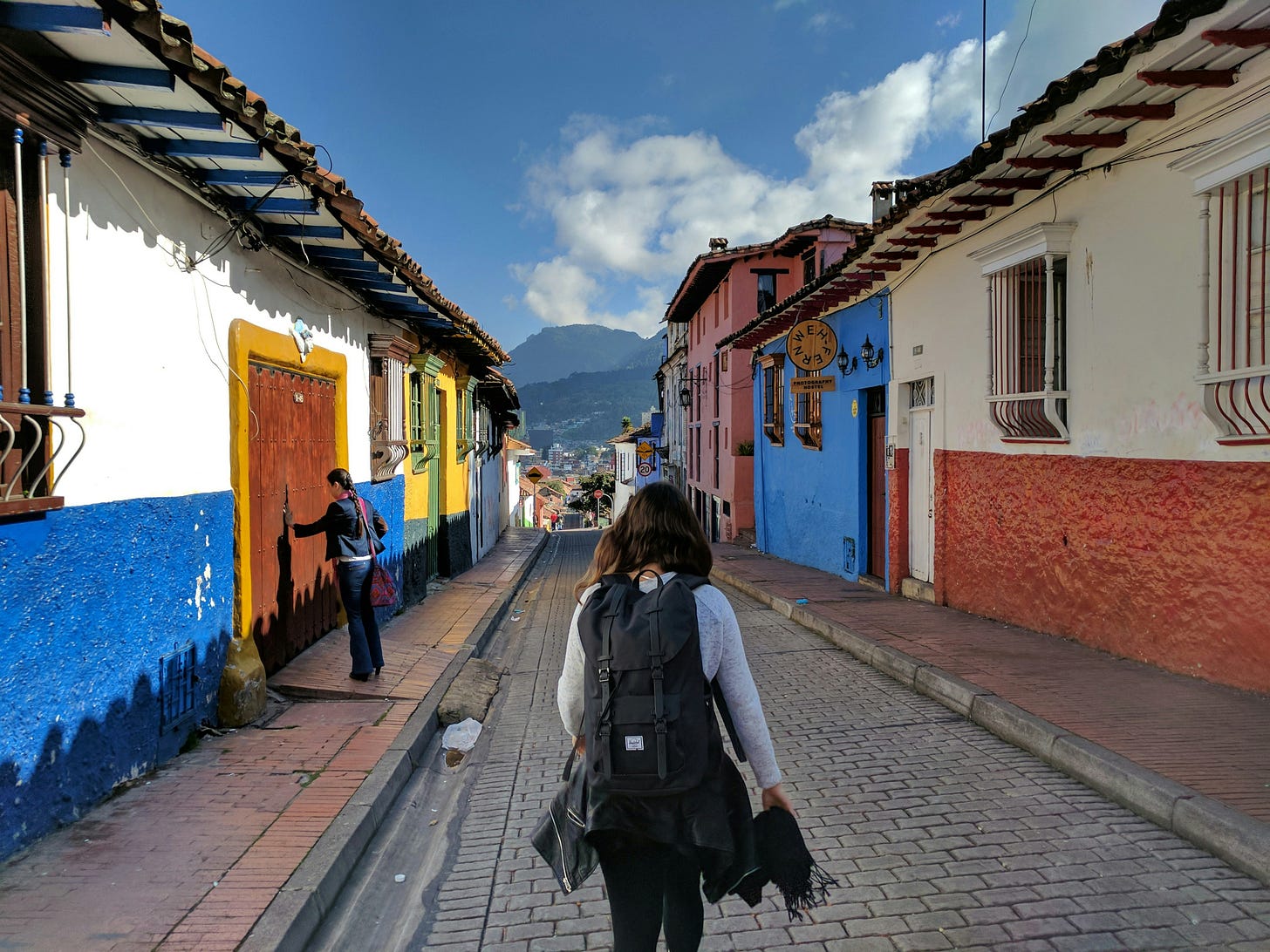Why I’ll Encourage My Kids to Travel, Not Enroll in University
How Being Abroad Gave Me More Knowledge Than My Degree

When researching Part B of The Big Fat 21st Century Lie, I came across a blog post listing the reasons why young adults want to attend university. It reignited an idea that's been floating around in my mind for a while: a mandatory or standardized live-abroad program for secondary school graduates.
I know, it sounds extreme, maybe even unrealistic. But hear me out: what if, instead of funneling young people into expensive degrees they may never use, we gave them the chance to experience the world firsthand? An unspecified amount of time to learn through culture shock, adaptation, independence, and exploration.
A program like this wouldn't reject education per se but would expand it. It could fulfill most of the desires that drive students toward university, but without the crushing debt or post-grad disillusionment.
Imagine this: instead of a four-year degree, a young person enters the workforce with four years of global experience, having lived abroad, navigated unfamiliar cultures, learned new languages, and adapted to constant change. What if that showed up on a résumé and was seen not as a gap, but as a credential? A testament to resilience, curiosity, and cross-cultural intelligence. That's the kind of real-world education we should be valuing.
What Travel Taught Me That School Never Could
The essay in draft, along with its research, led me to reflect on my time in and immediately after university. One thing that stood out to me was my travel experiences during that period—South Korea, Hong Kong, and Southeast Asia—and how formative they were for me. Honestly, they were more meaningful than the four years I spent at Carleton. In comparison, those trips were a fraction of the time I spent at school, but I remember them more vividly than any lecture, study session, or essay I wrote.
As I read through the list of reasons, I realized that most of them had nothing to do with higher education, gaining work experience, or building a career.
Here's what was on it:
To get into a Particular Career
For the Social Life
To Experience Somewhere New
To Get Smarter
To Meet New People
To Live On My Own
For Opportunities
It’s clear that most of these desires could be better fulfilled through alternative means. The more I thought about it, the more convinced I became that travel checks almost every box.
Sure, reason #1—getting into a specific career—doesn't align with the travel thesis. But let's be honest: a significant number of graduates don't end up working in their field anyway, so they may as well have gone traveling. As for the rest—social life, new experiences, meeting people, living independently, and finding opportunity—none of these require a classroom. Travel delivers all of that in spades. Even reason #4, "to get smarter," is achievable through far cheaper, often more engaging methods: a library card, deep-dive podcasts, or an honest commitment to "YouTube University." Frankly, I'm not sure I got smarter during university anyway, after killing untold brain cells at parties.
Expectations, Inheritance, and the Illusion of Choice
Like nearly half of all university graduates, I now question what I gained from my "Honours Degree in International History." Yes, I had to manage my time and work independently in my program, but no one taught me how to do that; I figured it out on my own.1 And, yes, going to university gave me experience in researching, forming narratives, and coherently writing thesis papers (which undoubtedly has value in my current endeavours as a freelance writer), but the distance between then and what I do now—20 years later—seems so vast I doubt it has any relevance.2
When I reflect on my motivations for pursuing a post-secondary education, I realize that my reasons are as weak as those listed. For comparison, my list was:
"That's what you're supposed to do," followed closely by,
"It's what all my friends are doing." My final reason?
"It won't cost me anything."
Just as with the student list, my reasons were acceptable.
Now, I don't want to come off ungrateful—I don’t regret the opportunity or the time spent at uni—I just want to be frank: my father earnestly invested an inheritance left to him by his late mother (rest in peace Grammy and thank you) for the future education of my brothers and the then 6-year-old me.
The creation of this education fund set the expectation that I would use it to attend university, as my dad had done. I grew up understanding that this was what I would do when I was old enough. I don't doubt that many aimless eighteen and nineteen-year-olds still experience this same expectation.
When I reflect on it, I wasn't particularly excited about the prospect of attending university. I wasn't passionate about it and thoroughly disliked the application process. My grades weren't that good, and I narrowly secured a place at one of the three institutions to which I applied.
When I consider those factors, I doubt I would have pursued the post-secondary path had my scenario been different; I likely wouldn’t have attended if I had to pay for it or go into debt, as 67% of all graduates in my home province of Ontario often do now.
Ultimately, I went because I didn't know what else to do after high school, but I was expected to do something. Throughout my upbringing, society ingrained in me the notion that attending university was the "next logical step" for a middle-class white adolescent male; otherwise, you're a failure and a bum. "It's what employers are looking for," the rhetoric claimed, so I mindlessly went, not realizing that I would spend most of the preceding working years as my own boss.
Learning Beyond the Lecture Hall
Looking back, if I had been given another option, like travel, I would have taken it. And many of the 13 students who contributed to that list might have done the same. Based on what they were seeking, they might have chosen a different path entirely if only someone had encouraged them to do so.
Some of my most vivid memories from that stage of life aren't from lectures or libraries, but from travel: working and saving to go, planning the trips, and then setting out. I learned more about the world in a few short months abroad than I ever could have in four years of study.
As I mentioned, my degree was in International History, which focused on events in North America, Europe, and East Asia during the two World Wars, the interwar years, and the Cold War era. I wrote a paper on Ho Chi Minh while in school, but I learned far more about Vietnam from being there, experiencing the people and the physical and political environments firsthand. I now possess real, tangible knowledge about that country, and it's not because I learned about it in a third-year seminar.
While I learned a lot about communism in class, I got to witness it firsthand and in unexpected ways: watching the military rolling down the street in an armoured truck, belting out orders to the populace over a megaphone. The locals scurried around, obeying the commands. The fear was palpable. I wanted to make myself as inconspicuous as possible, even though I was there as a tourist. I couldn't imagine living like that. This happened in Saigon (renamed Ho Chi Minh City in 1976), which is known to be more chill than the northern capital. Life there was very different than anywhere I'd experienced before.
No words on a page could convey the frenetic energy of that moment. It made the history I learned very real and far more meaningful than any classroom lecture.
School Is Predictable; Life Isn't.
Therein lies a key aspect of what institutionalized learning lacks: the tangible realities and the potential for the unknown to shape the learning experience. When you attend school, you know what program you're in, what classes you are taking, and essentially, what you will learn. Whereas travel almost solely consists of the unknown, beyond booking your flight.
This unknown aspect is crucial for learning, as it expands your mind through experiences and prompts you to challenge deeply held beliefs. It keeps you on your mental toes, forcing you to problem-solve the inevitable challenges that come your way. Travel helps you grow and evolve as a person in ways that sitting in class can't. 3
And most importantly, the unknown leads you to places you can't even begin to imagine because you haven't experienced the precursor to that unknown thing yet. I realize that's a weird sentence, so let me clarify with an example. When my wife and I left on our 2020 Belize vacation, we never imagined the implications that boarding the plane would have on our lives two years later. It changed everything, and we would never have predicted it. That's a beautiful thing.
Learn Skills for Life
Having experienced both versions of education—the traditional butt-in-seats schooling and The School of Life Abroad—I can accurately weigh the value of each and say, beyond a doubt, that travel is a far better teacher. I don't mean to diminish my professors' experience and their ability to teach—they were great at what they did—but hindsight would have me invest that inheritance in physically being in the places I spent countless hours learning about at the campus library and in seminars.
After coming to terms with my own post-secondary experience and gathering a thorough understanding of the current debt-for-education statistics, the lack of availability of employment opportunities for graduates and the rapidly evolving digitization of modern life, the last thing I will do when my boys are ready to graduate is push them into a debt heavy post-secondary education.
The School of Life-Abroad

It baffles me: students list experience as their primary motivation for attending university, yet we still steer them toward institutionalized education. What they're seeking isn't coursework; it's life. And for what school costs these days—nearing $100K for a four-year program in Canada—they could travel the world on a shoestring for years, gaining real-life experience, personal growth, and cross-cultural insight.
Now, I fully realize that a mandated live-abroad policy would never work. The logistics alone would be a nightmare, never mind the ethical and legal implications of forcing people into a program they may not want to participate in. And unfortunately, the international cooperation required to launch a truly global initiative is far beyond our current political reality.
Still, the idea serves a purpose. It forces us to reimagine what post-secondary development could look like if we stopped defaulting to debt-heavy degrees. Ultimately, the goal of this piece isn't to advocate for a formal mandate; it's to shift perspectives.
What if we stopped indoctrinating young people into believing university is the only viable path? What if we redefined failure and started encouraging the kind of uncertainty that leads to growth?
A mandatory travel policy may never materialize, but that doesn't mean we can't actively promote travel as a legitimate—and in many cases, more effective—alternative to higher education. The richness of experience, personal evolution, and cross-cultural learning available in the world beyond the classroom is immense. And based on what young people say they're actually looking for—social connection, independence, adventure, and new ways of learning—travel fits the bill.
If you enjoy my writing, you might also like the Belize Foreigner Blog, the Lili Art Blog, or my award-receiving book Home in Good Hands. If you'd like to support this Substack and help me keep creating stories and essays about life abroad, consider subscribing, sharing, or making a small donation. And to those who already have—thank you. Your support means the world.
Perhaps this is an inherent trait of mine and the reason I leaned into self-employment not long after graduation.
I’ve learned a lot in the last three years and the face of research for essays is changing. When I was in school, I used mostly physical sources I found in libraries. Much of my research now is done online and with and AI assistant.
For history majors—and other programs too—it should be mandatory to visit the place of study and experience the history firsthand.






Encouraging enrolment at a University outside the US might provide the best of both worlds ...
I had a somewhat similar trajectory, except fifty years earlier. After bouncing around a couple of colleges before earning an associates arts degree from a community college in Colorado I was acccepted into the Peace Corps in a country that had just changed its name from British Honduras to Belize. After 2-1/2 years, I returned the U.S. and finished both my bachelors and masters degrees in Agricultural Economics. Now, all these years later, I'm back in Belize enjoying my place on the Belize River in Cayo.